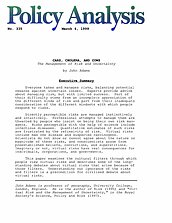Everyone takes and manages risks, balancing potential rewards against uncertain losses. Experts provide advice about managing risk, but with limited success. Part of their difficulty stems from an incomplete appreciation of the different kinds of risk and part from their inadequate consideration of the different mindsets with which people respond to risks.
Directly perceptible risks are managed instinctively and intuitively. Professional attempts to manage them are thwarted by people who insist on being their own risk managers. Risks perceptible with the help of science include infectious diseases. Quantitative estimates of such risks are frustrated by the reflexivity of risk. Virtual risks include mad cow disease and suspected carcinogens. Scientists do not know or cannot agree about the nature or magnitude of these risks, and nonscientists argue from preestablished beliefs, convictions, and superstitions. Imaginary or not, virtual risks have real consequences for individuals, corporations, and governments.
This paper examines the cultural filters through which people view virtual risks and describes some of the longstanding debates about virtual risks that arise because of those filters. Understanding our ignorance of the risks and filters is a precondition for civilized debate about virtual risks.
About the Author

This work is licensed under a Creative Commons Attribution-NonCommercial-ShareAlike 4.0 International License.
